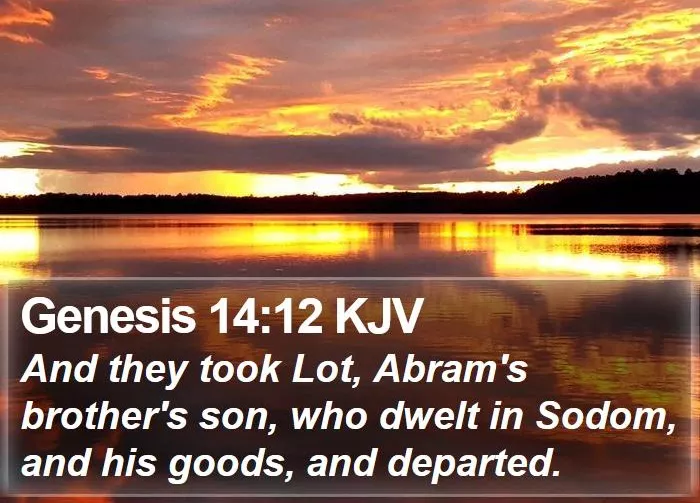Read the Daily Bible Verse Genesis 14:12 To Strengthen Your Spiritual Journey.
Genesis 14:12 states:
“And they took Lot, Abram’s brother’s son, who dwelt in Sodom, and his goods, and departed.”
This verse appears in the midst of a narrative about a military conflict involving several kings and their interactions with Abram (later named Abraham). It provides a crucial detail about Lot’s situation during this period of upheaval. Understanding Genesis 14:12 requires examining its context, the historical backdrop, and its implications for both the biblical narrative and contemporary life.
The Context of Genesis 14:12 KJV
To fully grasp Genesis 14:12, it is essential to consider the broader context of Genesis 14. This chapter details a significant event where several kings waged war against one another. The conflict involves four kings from the east who defeated the five kings of the cities of the plain, including Sodom and Gomorrah.
Historical Background:
The Kings and the Battle: The four eastern kings led by Chedorlaomer defeated the kings of Sodom, Gomorrah, Admah, Zeboiim, and Bela (Zoar). This war is significant because it sets the stage for Lot’s capture and Abram’s subsequent intervention.
Lot’s Capture: Genesis 14:12 highlights that Lot, who was living in Sodom, was taken captive by the invading kings. This detail is pivotal as it leads to Abram’s rescue mission, which further establishes Abram’s role as a protector and leader.
Geographical and Social Context:
Sodom: At this time, Sodom was known for its wickedness and was part of the region involved in the conflict. Lot’s choice to live in Sodom reflects his willingness to reside in a morally questionable environment, which foreshadows future events.
Abram’s Role: Abram, Lot’s uncle, is depicted as a figure of righteousness and strength, who responds to the crisis by rescuing Lot and recovering the goods taken.
The Genesis 14:12 Meaning
Genesis 14:12 serves multiple purposes within the narrative:
The Significance of Lot’s Captivity: Lot’s capture symbolizes the larger conflict affecting the region. His situation reflects the broader consequences of the war and the instability it causes.
Abram’s Compassion and Responsibility: The verse underscores Abram’s familial duty and his compassion. Despite Lot’s choices, Abram takes decisive action to rescue him, showcasing his character and leadership.
Theological Implications: From a theological perspective, the verse can be seen as a foreshadowing of God’s deliverance and protection. Abram’s intervention highlights the concept of divine justice and the moral imperative to act righteously in the face of wrongdoing.
Genesis 14:12 Application in Life
Genesis 14:12 offers practical lessons for contemporary life:
Responsibility and Compassion: Just as Abram took responsibility for Lot despite his questionable choices, individuals are encouraged to act with compassion and integrity, even when it involves personal sacrifice.
Moral Choices: Lot’s residence in Sodom raises questions about the influence of one’s environment on moral decisions. It prompts reflection on the importance of making choices aligned with ethical and spiritual values.
Protective Action: Abram’s readiness to rescue Lot demonstrates the importance of standing up for others in times of need. This can be applied to modern situations where individuals are called to advocate for and support those in distress.
See Also: Genesis 14:11 Meaning, Context & Commentary
Comparison with Other Biblical Texts
Comparing Genesis 14:12 with other biblical texts reveals deeper insights:
Genesis 19: In this chapter, the destruction of Sodom and Gomorrah is described, showing the consequences of living in a place of pervasive wickedness. Lot’s story continues here, highlighting the outcomes of his choices and the divine intervention in his rescue.
Luke 15:4-7: Jesus’ parable of the lost sheep reflects the idea of seeking and rescuing those who are lost, akin to Abram’s rescue of Lot. Both narratives emphasize the value of each individual and the lengths to which one should go to offer help.
Matthew 5:14-16: Jesus’ teaching about being the light of the world parallels Abram’s role in providing moral and practical guidance. Abram’s actions serve as an example of how individuals are called to shine light in dark situations.
Modern-Day Relevance
Genesis 14:12 remains relevant in contemporary discussions:
Ethical Leadership: Abram’s response to Lot’s capture exemplifies ethical leadership. Modern leaders and individuals are called to act with integrity and compassion, particularly in challenging situations.
Family and Community: The verse emphasizes the importance of familial and communal responsibilities. In today’s society, this translates to supporting and protecting family and community members, especially those who are vulnerable or in distress.
Crisis Response: Abram’s intervention in a crisis can be seen as a model for responding to modern emergencies and conflicts, encouraging proactive and compassionate action.
Conclusion
Genesis 14:12 is more than a historical detail; it encapsulates themes of responsibility, compassion, and ethical conduct. By taking Lot captive, the verse highlights the personal and communal implications of the conflict described in Genesis 14. Abram’s actions set a precedent for moral behavior and leadership, providing timeless lessons applicable to various aspects of life.
Genesis 14:12 Commentary
The commentary on Genesis 14:12 offers a deeper exploration of its significance:
Historical and Cultural Context: Understanding the geopolitical and cultural dynamics of the time enhances the comprehension of this verse. The capture of Lot by the eastern kings is not merely a narrative detail but a reflection of the broader conflicts affecting the region.
Moral and Ethical Lessons: Abram’s response to Lot’s capture is a profound demonstration of moral and ethical leadership. The verse invites readers to consider their own responses to injustice and their responsibilities toward others.
Theological Insights: The theological implications of the verse underscore the notion of divine justice and protection. Abram’s actions can be seen as a reflection of God’s overarching plan for justice and deliverance.
In summary, Genesis 14:12 is a pivotal moment in the biblical narrative that offers valuable lessons on leadership, compassion, and moral decision-making. Its relevance extends beyond its immediate historical context, providing enduring insights for contemporary life.


